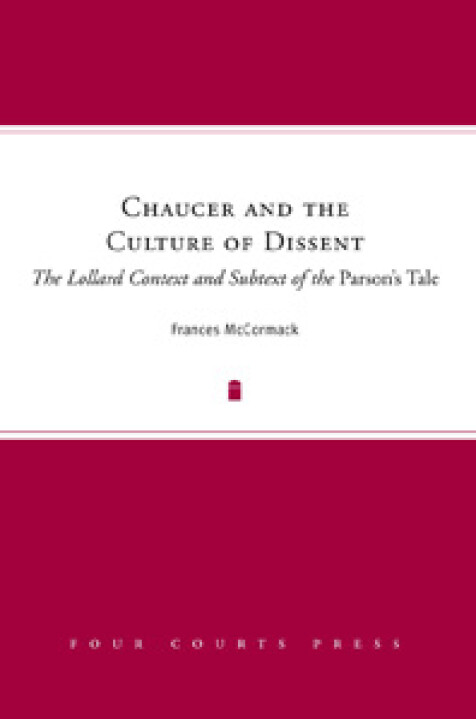Chaucer and the culture of dissent
The Lollard context and subtext of the Parson's Tale
Frances McCormack
‘Questions about Geoffrey Chaucer’s adherence to Lollardy and the presence of Lollard ideology in his works have dogged critics and scholars for years. It is a vigorous debate, one to which Frances McCormack’s Chaucer and the Culture of Dissent makes several valuable contributions. Grounded in intensely close readings of both Lollard sermons and a variety of Chaucer’s literary works, McCormack’s study is an intelligent and thoughtful work that provides new understandings of Chaucer’s texts and how they may have been read or received by his contemporary audience. In clear, articulate terms McCormack examines the evidence for Lollardy … McCormack's work is a valuable and engaging contribution to this enduring debate', Larissa Tracy, Eolas (2010).
'With Chaucer and the Culture of Dissent, Frances McCormack joins the growing number of voices ... pressing for a reassessment of what has long been Chaucer's least favourite and least studied Canterbury Tale. The Parson's Tale, McCormack avers, ‘may well be the most complex’ of Chaucer's writings, a work at once ‘deeply political’ and ‘deeply personal’ (p. 104). In it, moreover, we find ‘Chaucer at his most playful, creating a hornet's nest of interpretation for his reader who must tackle the hermeneutic problems posed by this Tale’ (p. 185)', Karen Winstead, Review of English Studies (2008).
'McCormack ‘explore[s] in immense detail the possible forms of overlap between the language and tropes of the tale and what are recognized as Lollard writings … These are promising lines of approach, and the author documents in scrupulous detail what she discovers', Julia Boffey, TLS (June 2008).
‘Her thorough and nuanced analysis of the Parson’s Tale invites readers to rethink the scholarly consensus on the Tale’s orthodoxy not only showing the Tale’s indebtedness to Lollard language and ideas, but also by explaining why these often are indistinguishable from orthodox ones … McCormack maintains her focus on the Tale’s ambiguity throughout her book, which combines both literary and historical approaches. Though the Parson’s relationship to the late medieval English heresy Lollardy has been debated by Chaucerians since the nineteenth century, McCormack injects new energy into the conversation by challenging the traditional evidence on which the relationship was based in the first place … McCormack’s fine and detailed study must be commended for paying close attention to one of Chaucer’s least studied tales … one cannot (and should not) underestimate the value of McCormack’s study for Chaucer’s project as a whole and for our understanding of the diverse religious culture of late medieval England', Andreea D. Boboc, Anglia-Zeitschrift für englische Philologie.
‘Over the past few decades, the reinvigorated study of Lollard groups and their writings has added a great deal to our knowledge of the cultural context of literary production in late-medieval England … [the book is] a vigorous expression of the controversial view that Chaucer had Wycliffite sympathies … McCormack’s book presents a good foundation for the reassessment of the Parson’s Tale', Richard Newhauser, Journal of English and Germanic Philology (January 2010)

